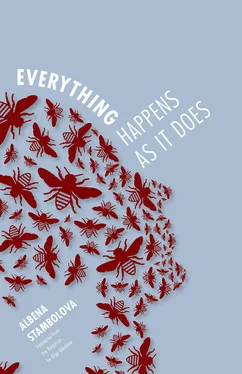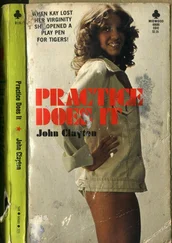Just when Mr. V. was ascending into the realms of slumber, Maria was spreading a white tablecloth in the house of Boris’s parents. She had brought not only groceries, but also a cooked meal for dinner. The old woman, in turn, had baked a loaf of bread and had prepared stewed dried fruit, honey, and pickled vegetables. The old man was holding his grandson and the two of them were babbling joyfully to each other. There had just been a power outage and two gas lamps illuminated the small room, their light joined by the glow of the fire. They sat at the table, on which lay a variety of dishes as was custom. The baby was put in its basket. Maria looked at the tiny old man and woman, as if trying to capture them in the lens of a camera. In their little cottage, with their cat and dog, with their blue eyes and apple-pink cheeks, with their dark clothes and lilting voices. They were like something out of a picture; no, rather, they were a picture, a living one. The grandfather blessed the bread and named each piece as he broke it off — this one for the house, this one for the baby, this one for Boris, and so on, for each one of them.
Fanny’s kitchen was bustling with life. The spell was lifted from the appliances, pots and pans chittered on the hot stove, cabbage was being chopped on thick wooden boards and sprinkled with paprika, platters were being arranged with pickles and dips, glasses were being passed from hand to hand, drinks were being poured generously. All guests, feeling truly welcome, had an air of devotion, regardless if their work was contributing to the common good. Even Mr. V., gently snoring by the fire, was in a state of perfect happiness.
The music was pounding. Long forgotten lamps along the walls were lit again, their warm rays blending all rooms into one hall of light. Fanny walked back and forth, as if a guest in her own house, incredulous that a turn of fortune could have such dizzying dimensions. It made it seem worthwhile to have hibernated all this time. She felt amazed that the crowd of people could organize itself so efficiently, that the guests were singing and dancing and taking care of each other. She instinctively checked herself: thinking too much could bring back the iciness, so she spun on her heels and started running, waving a bridle of garlands with which someone had adorned her. Near the Christmas tree she saw the girl, Margarita, who had decorated it. Someone was holding her arm and whispering in her ear. Margarita was peering at a magnificent portrait by Ivan Lazarov as if she were about to dive into it.
The doorbell burst into song again; who was it this time? Someone opened the door before Fanny had time to decide whether to head in its direction. In a few seconds the wave washed a flustered young man to her side. She recognized Mr. V.’s chauffeur. She was confused for a moment — she had completely forgotten Mr. V. The young man’s presence suddenly made her remember her mother and the host of laws and obligations that resurfaced every Christmas. Before she could do anything about it, the issue was merrily taken up by half a dozen people. Instead of showing him to the person corresponding to the description of Mr. V., they led the young man to the kitchen. It was too late to stop them. Fanny waved to him from a distance just before he disappeared. It crossed her mind that the chauffeur, who was familiar with the house and knew her well, probably felt like he was dreaming. Tonight, the world was upside down.
32. And How They Taper Off
Philip, the father of the twins, was pacing back and forth like a panther in his small apartment. Christmas Eve was an especially difficult time for him. Numerous friends had invited him for dinner with their families, but all invitations had been declined with the made-up excuse of an engagement elsewhere. In the week before Christmas, he had tried repeatedly to get in touch with someone at his wife’s house, but the phone had rung in vain. Now he was trying to resist the urge to go out, and only the hope of a call from one of the children, or Maria, stopped him. Why the hell hadn’t he gotten an answering machine? He knew that, at the end of the day, he would leave the house and bury himself in one of his regular haunts.
He should have accepted one of the invitations, like he had done the year before. But he had decided not to for some unknown reason, and had thus painted himself into a corner. He could not understand why he felt such indomitable rage — which he knew to be the source of his misery. Yet, he was convinced that if he subdued his anger, if he became humble, he would be finished.
He downed another small glass of vodka and continued pacing his kitchen. A distant sound of inconsolable weeping always accompanied him, and after each moment of forgetfulness, Philip returned to his internal restraint, the stake next to which he lay like a chained dog.
Of course, he could “work on himself,” as his doctor used to say, words one would expect from a communist youth leader at a high school party meeting. But why work on himself, why try to become other? In order to feel better, was the inevitable answer. At times he felt like he was crawling, squeezing his shoulders through a tunnel too narrow to turn back. It’s possible to go back, everyone said, but Philip didn’t want to. He wanted to have it all, now and here. He wanted Maria, he wanted his children, he wanted himself with his children and Maria. He could picture himself being with them. Whenever he fell into drunken reveries — the only moments the emptiness around him became animated — he surrendered to such dreams.
He banged the glass on the kitchen counter with sudden determination, grabbed his coat on his way to the door, and rushed to the car waiting faithfully for him downstairs.
33. Revolution and the Head
Mr. V. stirred and felt that he was barefoot. Pleasant warmth was coming from the fire and he opened one eye. There they were, his pink feet heated by the flames. Someone had taken off his shoes and socks, and Mr. V. realized that he had been sound asleep. The lights were out and the door was closed. He was probably alone in the room. He could hear steps and voices and music on the other side. The smell of delicious things awoke his senses.
His next thought made him jump. Madame, Christmas Eve, and everything else. He gave a snort that sounded like a perfect imitation of a horse, a liberty he took only when he was alone.
But then he noticed that he was not alone. He could feel a presence by the massive desk in the corner. He turned toward the noise and made out a dim shape on the desk. The thing was alive and getting to its feet. A cat, Mr. V. guessed. Pavoné, Fanny’s cat, Fanny’s notorious, misanthropic cat.
The creature had fixed its glimmering eyes on him and was slowly rising, which made Mr. V. very uneasy. His bare feet stayed where they were, but the yellow irises kept rising and rising above endlessly stretching paws. Good God, that’s not Pavoné, but some nightmarish beast a devil has bred for some hellish purpose!
At this moment the clock on the wall struck the hour. The cat continued to uncoil its body, bigger and bigger with each chime…
After what seemed an eternity, Mr. V.’s head filled with silence, the cat stopped growing, and its mouth opened into a gigantic yawn. Fanny came in and wished him Merry Christmas.
Mr. V. braced himself for a battle. He searched around for his socks and his shoes and was very soon surrounded by people laughing and talking excitedly. Everyone was searching, but the socks and shoes were nowhere to be found. Mr. V. remained irrevocably barefoot. Suddenly he realized he was starving.
They led him into the kitchen, where he enjoyed the most revolutionary feast in his life. He was eating ferociously, as if in a struggle to change the entire world order. He threw himself on the innumerable plates and glasses with a force that gathered in itself everything he would have to later explain to Madame. An onlooker would have thought that, instead of taking energy from the food, he was expending great amounts of it by chewing and swallowing, all the time oblivious to his bare feet.
Читать дальше











